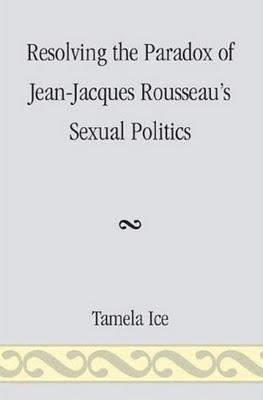Resolving the Paradox of Jean-Jacques Rousseau's Sexual Politics

Professor Ice begins her book with what she calls a paradox within philosopher Jean-Jacques Rousseau's social philosophy. In her words, “Rousseau's views on women sits [sic] in tension with his philosophy of freedom and equality.” That is, Professor Ice refers to the apparent discrepancy between Rousseau's vision of freedom for men and his endorsement of subordination for women. In the first chapter, Ice begins by exploring Rousseau's identity and sexual politics to determine Rousseau's definition (description would be better) of “woman.” Next, in the second chapter, she discusses what she considers Rousseau's overarching philosophical project—“the restoration of a sense of equality among men as men.” Thus, the question becomes: Does Rousseau's sexual politics undermine his larger project of restoring this sense of equality among men? In chapter three, Professor Ice moves to a discussion of the depiction of psychological alienation in literature to describe what happens to women when they are psychologically dependent and living in bad faith. In chapter four, Professor Ice directly employs selections from Simone de Beauvoir's oeuvreas a lens for refocusing interpretations of Rousseau.
I am sympathetic to the desire to connect Rousseau and Beauvoir. Indeed, stylistically, they are mutually sympathetic. Both Beauvoir and Rousseau have been lambasted by (some) feminists and other critics for insisting upon a status quo which they merely (brilliantly, feelingly) describe. It is not the case that there is no connection to be made between Rousseau and Beauvoir, it is simply that Ice never justifies her comparison. She never tells her reader why she chooses Beauvoir as a foil for Rousseau; she never explains why “bad faith” is something about which we ought to worry; she never explains why and how it is she justifies her anachronistic application of a twentieth century existentialist concept to an eighteenth century Enlightenment philosophy. Even if the reader were to set aside the lack of justification (and the regrettable editing errors), she must still contend with Ice's interpretation of Rousseau's sexual politics and social philosophy. Ice notes the masculine language Rousseau uses to discuss the civil “man,” but never looks at Rousseau's moral project (or even appears to recognize a moral project in Rousseau's work).
One might note a sort of progression in Rousseau's genealogy of human social development: wild, natural, civil, moral. The moral person is the culmination of Rousseau's project and the moral person comprises a man and a woman: in Emile, Rousseau claims that the community created by a woman and a man “produces a person...” (emphasis added). There is no moral humanity without women; men alone, as men, cannot be taken as the measure for (full) humanity.
Unfortunately, although Ice attempts a revision of Rousseau scholarship, there is nothing revisionary in her tired invocation of an illicit major premise: all men are human, no woman is a man, therefore, no woman is human. Rousseau doesn't take man, by himself, for the measure of humanity and doesn't measure women against men. When feminist academics employ such faulty logic, they disadvantage their scholarship and often miss subtleties that can be more fruitfully explored.